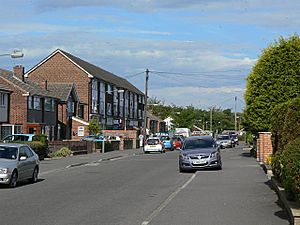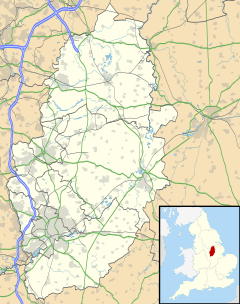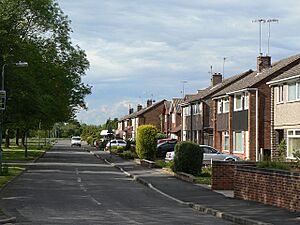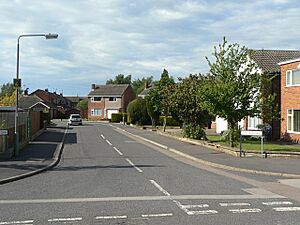Silverdale, Nottingham facts for kids
Quick facts for kids Silverdale |
|
|---|---|
 Monksway, Silverdale in May 2009 |
|
| OS grid reference | SK 56208 35648 |
| District | |
| Shire county | |
| Region | |
| Country | England |
| Sovereign state | United Kingdom |
| Post town | NOTTINGHAM |
| Postcode district | NG11 |
| Dialling code | 0115 |
| Police | Nottinghamshire |
| Fire | Nottinghamshire |
| Ambulance | East Midlands |
| EU Parliament | East Midlands |
| UK Parliament |
|
Silverdale Estate is a neighborhood in Nottingham, England. It's a residential area with homes built in the late 1950s. Silverdale is known for its community spirit and green spaces.
Contents
The Story of Silverdale Estate
How Silverdale Was Built
Silverdale Estate was built by a company called George Wimpey in the late 1950s. The land used to be part of a farm called Wilwell Farm. Silverdale is located near other areas like Clifton, Compton Acres, Wilford, and Ruddington.
At first, this area was called the Ruddington Lane Estate. In 1965, it was renamed Silverdale. This new name came from "Silverdale Farm," which was another name for a part of Wilwell Farm.
Homes and Shops
Over 450 brick houses were built in Silverdale in about three years. Unlike the nearby Clifton Estate, Silverdale was planned as a private estate. This meant it had only one main road in and out, though there were many footpaths.
When it was first built, Silverdale did not have its own public transport. It also did not have its own schools, and it still doesn't today.
A pub called the Clifton Bridge Inn was built at the entrance to the estate. Locals often called it "The Ponderosa." There was also a small shopping area on Monksway. It had shops like a hairdresser, a chemist, a newsagent, a butcher, and a grocery store. Over time, some of these shops have changed or become homes.
Community Life
In the early 1970s, a community center was built. Residents helped raise money for it by buying "bricks." The center was meant to be a youth club and was very popular. It's located on an area called The Downs.
Silverdale even had its own football team, Silverdale United, in the early 1970s. They played their home games near Brookthrope Way. The team was quite successful, even playing in competitions in Winnipeg, Canada.
The Black Path
Since Silverdale didn't have its own schools, children walked to schools in Clifton or nearby areas. One path they used was a rough, unpaved track. A Silverdale resident helped get the path paved and lit.
Residents called this path "The Black Path." This was because the lights often didn't work, and one side of the path had a small group of trees, making it very dark. Today, this path is known as "Silverdale Walk."
Schools Near Silverdale
Children from Silverdale attend several schools in the surrounding areas. Some of these include:
- Farnborough Spencer Academy
- Central College Nottingham
- South Wilford CofE Primary School (also known as St Wilfrids)
Many students also go to other public schools in Nottingham city center. In the past, boys from Silverdale often went to Fairham Comprehensive School, which was located nearby on the Clifton Estate.
Fairham Brook
What is Fairham Brook?
Fairham Brook is a small river that flows through the low-lying land between Clifton and Silverdale. It eventually joins the River Trent. The former Fairham Comprehensive School was named after this brook.
Flooding and Protection
Sometimes, Fairham Brook would flood, covering large areas of land. The houses in Silverdale and Clifton were safe because they were on higher ground. However, playing fields would often be underwater for about two weeks.
When the Brooksby Primary School was built, the brook's path was changed a little. To help students get to school during floods, a raised footpath was built. This path connected the school gate to higher ground near the school buildings.
Today, large parts of Fairham Brook are protected. They are part of the Sites of Special Scientific Interest, which means they are important for nature. The area is open to the public and is a great place to see wildlife.
Wildlife in the Brook
Fairham Brook is home to many different kinds of fish, including chub, perch, roach, and brown trout. You might also spot birds like kingfishers and herons. Otters and water rails have also been seen there.
Silverdale Today
In 2008, plans were approved to build a care facility for older people on the site of the old Brooksby Primary School. This new facility would replace an older one and provide more beds for residents. As of 2021, the site is cleared, but no new buildings have been constructed yet.
A bike and walking track was built alongside Fairham Brook in the late 1990s. This track connects Clifton with Silverdale and runs behind the Community Centre. It's a great place for residents to exercise and enjoy nature.
The Silverdale Community Centre is still very active today. Local residents use it for many community and sports activities. Families also use its pre-school and childcare programs.
Getting Around Silverdale
Bus Services
When Silverdale was first built, public buses did not enter the estate directly. Residents had to walk to bus stops on Ruddington Lane or Clifton Boulevard.
Today, Nottingham City Transport (NCT) provides a bus service that comes into Silverdale. This service runs seven days a week from Monksway.
Current bus routes include:
- L1: Nottingham - Trent Bridge - Wilford Lane - Wilford Village - Silverdale.
- L22/L23: Silverdale - Clifton - Ruddington - West Bridgford - Gamston.
Tram Services
The Nottingham Express Transit (NET) tram line runs close to Silverdale Estate. This tram line follows part of an old railway line. It helps residents of Silverdale get around Nottingham.
The closest tram stops for Silverdale residents are on Ruddington Lane in Wilford and Southchurch Drive in Clifton. The tram line became fully operational in 2015.
 | Ernest Everett Just |
 | Mary Jackson |
 | Emmett Chappelle |
 | Marie Maynard Daly |




